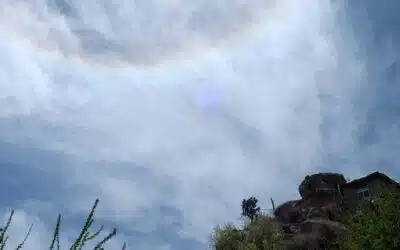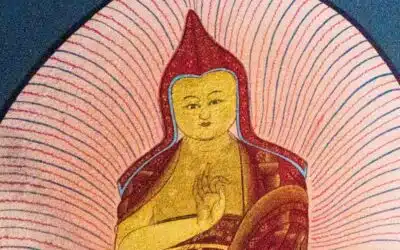The Illusory Path

Written By Mila Khyentse
Blog | The Dzogchen Journey
In “The Illusory Path”, Mila Khyentse talks about the no path of the Great Perfection, walking with the illusion…
Series: The spiritual path in Dzogchen
Deepening the Dzogchen path
The Illusory Path
The Illusory Path One of the most common expressions used when talking about the Great Perfection is “Ground, path and fruition” (tib.: gzhi lam ‘bras bu). These three, like “View, meditation and integration” (tib.: lta sgom spyos gsum) cannot be separated. Therefore, the reality of the path, the practice of Great Perfection, cannot exist without the view, which is the ground, and the fruit, i.e. the result. As Jigme Lingpa says, in The Prayer of Ground, Path and Fruition in The Heart Essence of the Great Matrix Space (tib.: kLong chen sNying thig): Since it’s pure from the beginning, even the term “view” doesn’t exist. Since it’s natural empty essence, the blanket of meditation falls away. Since it is objectless, integration is neither to be held nor to be freed. Entering the matrix natural expression, the uncomplicated naked state, May there be no deviation or error in this crucial point of the path!
(རང་ངོ་རྣམ་དག་སྐྱེ་མེད་ཀ་དག་ལ༔ ལྷུན་གྲུབ་འདུས་མ་བྱས་པའི་གདངས་ཤར་བ༔ གུད་དུ་མ་བཟུང་རིག་སྟོང་ཟུང་འཇུག་ཆེར༔ རྟོགས་པས་གཞི་ཡི་དགོངས་པ་ཚད་དུ་ཕྱིན༔ ལམ་གྱི་གནད་ལ་གོལ་ཕྱོགས་མེད་པར་ཤོག༔)
“We don’t have to change anything in our existence. It’s the result where it is, i.e. where I really am: here and now.“
In this way, since Dzogchen, the Great Perfection, is pure in the Ground, no view can determine it, no practice can attain it and no result can be maintained. This is why we speak of an illusory path, for there is nothing to be done, purified or perfected in the practice of the Great Perfection. It’s an “ultimate” state where View, meditation and integration, as well as Ground, path and fruition, are all there at the same time, in the same place, in the very nature of our own mind. Nothing is to be sought, and therefore nothing is to be achieved. This is the path that is no path. So there’s no need to cover ourselves with the blanket of meditation, because it doesn’t really exist in the practice of Great Perfection. The crucial point of the path is to remain in the natural state (tib.: gnas lugs), the naked, uncomplicated state which is thus neither fabricated nor maintained by factitious meditative practice. There’s nothing to do, because everything is in the Ground. Easy to say? Perhaps. Easy to do? Certainly not, even if it is the simplest practice there is.
As stated in the “Four Ways of Leaving as it is” (tib.: cog bzhag bzhi), the main practice of Trekchö (tib.: khregs gcod), “Undoing the binding”: Whatever the posture of the body, this is the posture of the practice. Whatever the posture of the eyes, this is the posture of the practice. Whatever the appearance, that is the practice. Whatever the state, that is that of practice. Do we then need to apply anything special in Dzogchen? No, simply apply the view of the Great Perfection in all activities of body, speech and mind. We don’t have to change anything in our existence. It’s the result where it is, i.e. where I really am: here and now. All the time. It doesn’t matter what the conditions are, it doesn’t matter whether I accept or reject them, it doesn’t matter what I think exists or not. I simply take the illusion as my path, as well as its primordial nature, clarity-luminosity (tib.: ‘od gsal). This is the essence of the practice of Great Perfection: the illusion of the path or the illusory path. Nothing could be simpler…
More Posts
Being Your Own Master
Relationship with a master requires discernment. “Being your own master” offers insights into understanding devotion and avoiding pitfalls.
Phenomena
"Phenomena" is the second entry in a new category designed to improve understanding of essential Dzogchen words and concepts.
The Story of the First Masters: Manjushrimitra
We continue the Stories of the First Dzogchen Masters with Manjushrimitra, who structured the verses of Dzogchen into three series.




